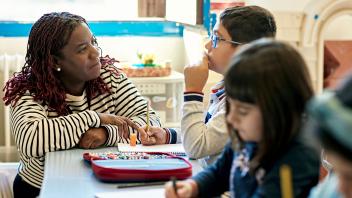If you follow us on Twitter , you know that I was in Chicago at a conference sponsored by the Center for Development and Learning . I’ve got lots to share from the conference; there were several great speakers and exhibitors. Many attendees came by the Reading Rockets booth to tell me that they use the site all the time, especially our Parent Tips .
One presentation I went to was “Vocabulary Instruction and Language Development for English Language Learners,” presented by Maria Elena Arguelles. She’s a dynamic speaker whose anecdotes had us laughing all the way through. As she talked about effective instruction for ELLs, I was reminded that what’s good for ELLs is really good for all young learners. That’s a good thing for teachers! We definitely don’t need more work.
One aspect of language development she talked about was reducing the language load when you’re introducing a new topic or content to kids (again, she was talking about ELLs, but this is something that I think generalizes to all kids). She recommends that teachers be aware and work to “carry the language load on your shoulders.”
To demonstrate, Arguelles used the vocabulary words “typical” and “atypical.” Assuming some instruction had already taken place, Arguelles demonstrated a simple method for ascertaining whether we knew the vocabulary. She posed several scenarios (“A cow with two heads, yawning when you’re tired”). We gave a thumbs up if it was typical, thumbs down if it was atypical. Simple, right?
In “deconstructing her teaching actions” (conference-speak…) her method (1) required no oral language on our part, but a scan of thumbs helped her know who had it right or wrong, (2) involved all learners, (3) enabled her to provide wait time, (4) incorporated consistent prompts and cues (she used “Show me”) and (5) provided immediate feedback. This makes for an opportunity to focus on the vocabulary (typical, atypical) rather than a language load.
Simple, but powerful. Would this work for you? More to come!

